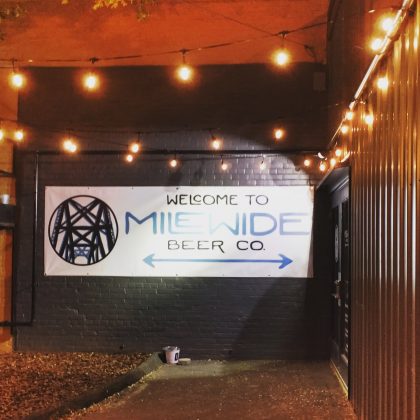My New Year’s resolution was going to be writing this column weekly, rather than twice monthly, in 2014. Might as well get started.
Whether working as brewers, taco slingers, distillers, baristas, vintners or sous chefs, we customarily inhabit an insular space within the hospitality industry zone.
Of course, the trick is to make insularity more expansive, and to link and project our individual artisanal skills in a big-picture way so that the ripples carry beyond the inner sanctum of true believers, far out into the broader world where the casually interested people live. Get them to look your way, and you’ve got something.
Kentucky’s bourbon makers grasped this point long ago. As a spirit, bourbon is strictly defined, and even if the geographical element is somewhat more porous than before, the fact remains that bourbon makers consciously group themselves as Kentucky Bourbon, and are unified in anchoring a sizeable element of their product’s allure to a particular place – what’s more, to a specific state of mind, and to a story told often and persuasively.
It wouldn’t take a befuddled alien from outer space very long to absorb contemporary bourbon’s savvy place-making expertise. All bourbons come from quaint little towns in the atmospheric backwoods, where the 6th or 7th generation of a family relies on its oldest living member – generally a weather-beaten, impossibly wise male fueled entirely on pork belly and grits – to magically render hand-crafted rarities that city folks will sell their first-born children to possess. It matters less whether any of it is true, and more that the branding is irresistible and awe-inspiring.
The city? It usually gets a cut, one way or another.
When I was growing up, my father’s view of Louisville was a city governed by a coalition of bourbon, tobacco and horse breeders, with politicians finishing a distant fourth in the power hierarchy. Tobacco’s nicotine addiction may have jarred it from the governing elite, although its failure to self-reinvent as a hand-rolled, designer cigar purveyor didn’t help, either. The horse pimps are still very much with us, even if bankrolled from Arab sheikdoms. Right now, the Kentucky Bourbon Kingdom is second only to Big Coal, and the trail of native intoxicants originating in the mountainous hinterlands has become urbanized.
As well it should.
The only odd part about Louisville taking full advantage of its own time-honored position in the Commonwealth’s chain of bourbon legacies is that it took so long to cement. Combining the bourbon renaissance with the city’s astounding culinary reputation is as close to a no-brainer as can be experienced, drunk or dead sober – even when viewed by a New Albany city councilman.
And so it was that last week, Mayor Greg Fischer of Louisville breathlessly announced the summoning of a task force filled with corn-whisky conjurers and superstar chefs, with a PR- and tourism-driven mission of assisting an eager planet in viewing Louisville as the end-all when it comes both to bourbon and dining.
—
Naturally, it should come as no surprise when a politician expresses enthused, selfless willingness to tether himself to an explosively marketable phenomenon … and this is not to be taken as a criticism of Fischer. The idea is fundamentally sound, and at some point, he’ll need to be re-elected. In the mayor’s circles, it’s pronounced “win-win.”
Of course, there was a small catch.
Fischer’s advisors neglected to remind him that other elements of the city’s food and drink culture might feel slighted if not mentioned during the photo op, and indeed, nothing whatsoever was said about wine, coffee, food trucks … or craft beer. This is unfortunate, as a mere paragraph surely would have sufficed as appeasement, but someone ineptly dropped the ball … and thinking back to that insular space within the hospitality industry zone, it was inevitable that disaffection would come to be expressed.
As well it should have been.
I’ve mostly refrained from the ensuing ruckus. While NABC’s location in a neighboring state is subject to ever-changing conceptual definitions, some inclusive and others not, our connection to politics is inexorably Hoosier, That’s the way it works, and so I’ve been largely content to be a bystander and read as Sam Cruz of Against the Grain voiced annoyance on Twitter, Elizabeth Myers upped the ante at Louisville.com, and a thoughtful piece by Steve Coomes at Insider Louisville (where free-lancer Kevin Gibson originally broke the task force story) provided worthwhile counterpoint.
No one asked me (ahem), but I see all this as a valuable team building exercise. If there is to be a cogent rebuttal from the craft brewing community in Louisville and the state of Kentucky, it needs to stem from a position of principled unity among the breweries, and preferably, be expressed by the Kentucky Guild of Brewers (KGB). The message should be educational, about the craft beer segment as a whole, and addressing KGB’s existence and ultimate aims.
Politicians simply do not regard scattered on-line complaints with the same alacrity as those bearing even the slightest hint of massed, monolithic intent. For all I know, a statement of principle is already on the way to the mayor, better to snap his neck forward and suggest heightened diligence on the part of staff and himself in the future. Information? It makes him a better mayor.
Building blocks of cooperation and unity require time for organization, and this is a great and enduring challenge for craft brewers in the general sense. We’re independent-minded, under-financed, short-staffed and very busy – and what I’m learning more and more with each passing day is that we cannot afford to use these nagging circumstances as excuses.
As a director on the board of the Brewers of Indiana Guild, I can say that BIG has made considerable progress trudging uphill to a point where in Indianapolis, political personages like Louisville’s mayor (and his staffers) are becoming accustomed to consulting the craft brewing bloc, if only to gauge its point of view as an entity representing enhanced numbers and escalating economic clout.
The message might still elude county seats, and that’s why an active alliance between craft brewers and localists is so absolutely essential. For one thing, local brewing and localism are contextually synonymous. More importantly, local brewers telling their stories in local vernacular constitutes the only language any politician absolutely can be relied upon to understand – voting, remember? The story must be told over and over, to the point where you’re feeling like quaffing a nice, cold Miller Lite rather than repeating those same words yet again to a clueless council member or bumbling chamber of commerce propagandist.
That’s the way it works, and we just have to do it. Let’s hope Mayor Fischer gets the craft beer message, because there’s likely to be another seat at the table for those in a position to claim it … if they will.





